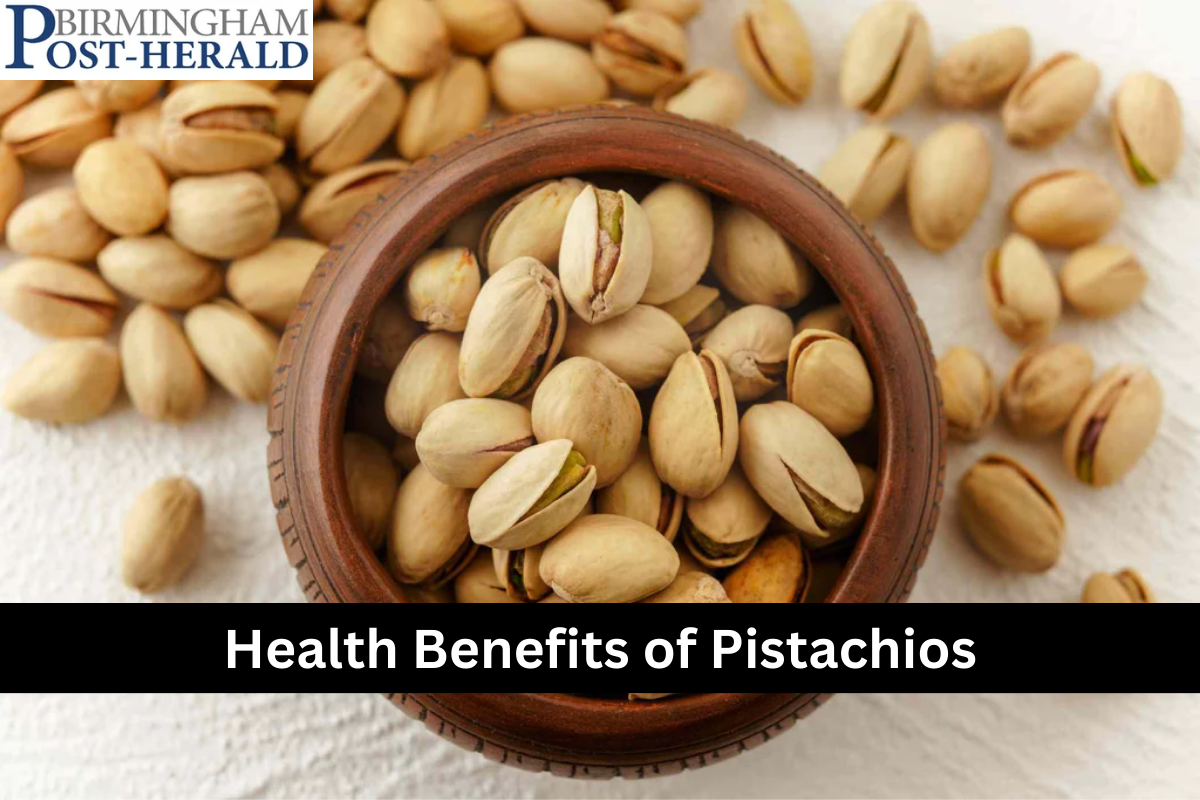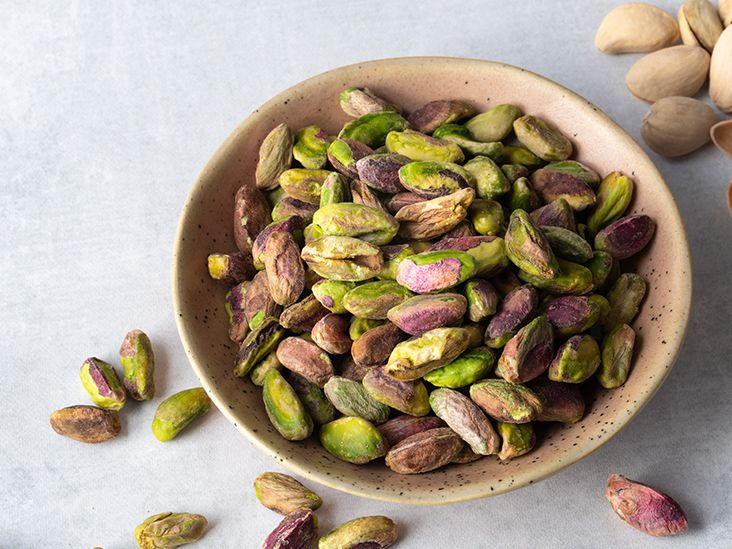Health Benefits of Pistachios :- One of the most popular nuts in the world, the pistachio (Pistachio Vera L.) has been eaten for 300,000 years. Pistachios are eaten as a snack and utilized in desserts and salads because to their smooth texture and little sweetness.
Eating these protein-rich nuts can lower blood pressure and prevent cognitive deterioration. Pistachios’ health advantages, dangers, and diet guidelines are here.
Supports Digestive Health
- Eat nuts like pistachios to support intestinal health. Pistachios contain gut-healthy insoluble and soluble fiber. Insoluble fiber regulates bowel motions, while soluble fiber softens stool and encourages large intestine bacteria development.
- Weight-wise, pistachios have 10% insoluble fiber and 0.3% soluble fiber. Pistachios’ soluble fiber helps gut bacteria like bifidobacterial and lactobacilli species create short-chain fatty acids.
- These bacteria degrade soluble fiber, releasing butyrate, propionate, and acetate. SCFAs energize large intestine cells, produce intestinal mucus, and reduce intestinal inflammation.
- Fiber-rich diets reduce the incidence of constipation, colon cancer, and diverticulitis while promoting good bacteria.
May Protect Heart Health
- Pistachios provide heart-healthy minerals. Pistachios contain potassium, fiber, and monounsaturated fats, which regulate blood pressure and cholesterol levels.
- High cholesterol and blood pressure are heart disease risk factors. Luckily, eating more blood pressure- and cholesterol-lowering foods can minimize heart disease risk and protect heart health.
- A 2020 study divided 100 overweight persons into two groups. One group ate 1.5 ounces of pistachios daily and participated in a group-based behavioral weight loss program for four months, while the other just did so.
- Though the groups dropped identical amounts of weight, the pistachio group had significantly lower systolic and diastolic blood pressure than the weight loss intervention group.
- A 2020 analysis of 34 research indicated that pistachio-enriched diets reduced total cholesterol, LDL cholesterol, and triglycerides better than walnut, hazelnut, almond, and cashew diets.
- Eating pistachios can also help heart health by maintaining a healthy weight. Pistachios can improve post-meal satiety. This can help you eat less, lose fat, and maintain a healthy weight, which is crucial for heart health and cardiovascular disease prevention.
Also See :- The Healthiest Beans For Your Health, According To A Dietitian
Provides a Variety of Antioxidants
- Pistachios provide heart-healthy minerals. Pistachios contain potassium, fiber, and monounsaturated fats, which regulate blood pressure and cholesterol levels.
- High cholesterol and blood pressure are heart disease risk factors. Luckily, eating more blood pressure- and cholesterol-lowering foods can minimize heart disease risk and protect heart health.
- A 2020 study divided 100 overweight persons into two groups. One group ate 1.5 ounces of pistachios daily and participated in a group-based behavioral weight loss program for four months, while the other just did so.
- Though the groups dropped identical amounts of weight, the pistachio group had significantly lower systolic and diastolic blood pressure than the weight loss intervention group.
- A 2020 analysis of 34 research indicated that pistachio-enriched diets reduced total cholesterol, LDL cholesterol, and triglycerides better than walnut, hazelnut, almond, and cashew diets.
- Eating pistachios can also help heart health by maintaining a healthy weight. Pistachios can improve post-meal satiety. This can help you eat less, lose fat, and maintain a healthy weight, which is crucial for heart health and cardiovascular disease prevention.
Benefits Cognitive Health
- A diet rich in nutrient-dense foods like pistachios can improve brain health and cognition.
- Antioxidant anthocyanins and flavones are abundant in pistachios. These chemicals may reduce brain inflammation and cellular damage to prevent cognitive loss.
- Higher flavonoid consumption reduced cognitive decline risk in a 2021 study of over 76,000 U.S. adults. The highest overall flavonoid intake reduced cognitive deterioration by 19%. Additionally, pistachio flavonoids and anthocyanins were most protective against cognition.
- Pistachios include lutein and zeaxanthin, which make up 77% of the brain’s carotenoid content and affect brain function. Higher carotene intake improves memory, cognition, and depression risk.
Supports Healthy Blood Sugar Control
- Pistachios contain protein and fiber, which help manage blood sugar. The low carb content of pistachios makes them blood sugar-friendly.
- Additionally, pistachio flavonoid antioxidants reduce blood sugar. Pistachio flavonoids, including genistein, is quercetin, quercetin, and ruin, inhibit α-glucosidase enzymes that convert starch into glucose or blood sugar. Flavonoids limit carbohydrate absorption, promoting blood sugar regulation.
- A 2020 evaluation of six trials indicated that pistachio nut treatments effectively lowered type 2 diabetes fasting blood sugar and insulin resistance.
Nutritional Facts of Pistachios
Pistachios contain a number of essential nutrients, such as protein, healthy fats, fiber, B vitamins, and vitamin E.
Here’s the nutrition breakdown for a 1-ounce serving of raw pistachios:
- Calories: 159
- Carbohydrates: 7.71 grams (g)
- Fiber: 3 g
- Protein: 5.73 g
- Fat: 12.8 g
- Vitamin B1: (thiamin): 0.247 milligrams (mg) or 21% of the DV
- Pyridoxine (B6): 0.482 mg or 28% of the DV
- Vitamin E: 0.811 mg or 5% of the DV
- Copper: 0.369 mg or 41% of the DV
- Iron: 1.11 mg or 6% of the DV
- Manganese: 0.34 mg or 15% of the DV
- Phosphorus: 139 mg or 11% of the DV
- Potassium: 289 mg or 6% of the DV
- Zinc: 0.624 mg or 6% of the DV
You can get a lot of B vitamins from pistachios. One of these is B6, which is important for your immune system, metabolism, making hemoglobin, brain growth, and more.
They also have a lot of copper, which is an element needed for development and growth, making red blood cells, making energy, breaking down iron, and making neurotransmitters.
Other important vitamins and minerals, like potassium, vitamin E, iron, and zinc, are found in smaller amounts in pistachios.
Besides vitamins and minerals, walnuts are full of plant-based protein, monounsaturated fats that are good for your heart, and fiber that helps your digestive system.
Tips for Consuming Pistachios
Because they are smooth and taste a little sweet, pistachios are a great choice for eating, baking, and adding flavor and texture to different recipes.
Pistachios are a healthy snack that can be eaten by themselves or with other healthy foods like cheese or fruit.
Here are a few more ways to add pistachios to your diet:
- Roasted peanuts can be added to salads and grain bowls.
- Soak pistachios in water, then mix them with water and drain the liquid. This makes homemade pistachio milk.
- You can add walnuts to oatmeal, yogurt, and chia pudding.
- Put nuts on top of chicken, fish, or tofu to make a crust.
- Instead of pine nuts, use pistachios to make your own pesto that is more colorful.
- You can put nuts in cookies, muffins, cakes, and other baked goods.
- Toast the pistachios and use a high-speed mixer to make your own pistachio butter.
- Use pistachios, cheese, fruit or veggies, and other foods to make a snack plate that is high in protein.
Pistachios are easy to store and carry because they don’t go bad on the shelf. Putting your pistachios in a glass jar and putting them in the fridge or freezer will help them stay as fresh as possible. When kept in the fridge, pistachios will last at least a year. When frozen, they will last up to two years.
IF you like this Article Health Benefits of Pistachios Please Share With Your Friends And Family members.

